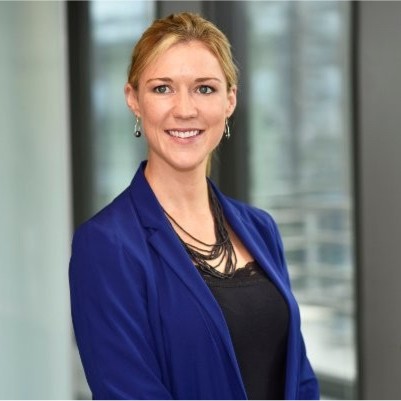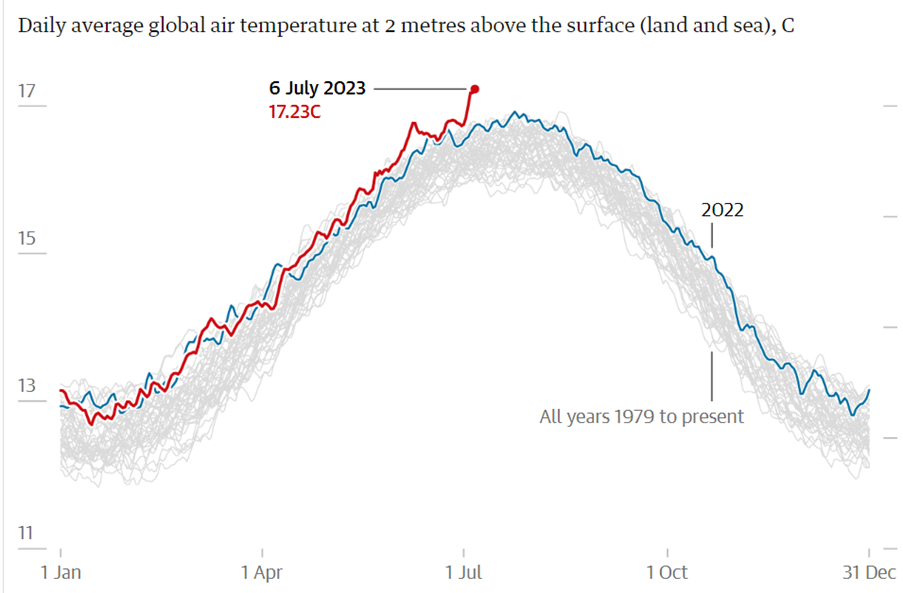Whyalla featured on hit documentary series Australian Story
In September 2018, the ABC’s hit documentary series Australian Story tracked ...


As I write this, the world has just recorded its hottest ever average temperature and many locations across Europe are on fire. Whilst one hot summer does not equal climate change, the trend in the picture below is pretty clear and has led leaders and investor groups around the world to call for accelerated climate action.

The BBC has a free to read explainer on the link between extreme weather and climate change for those wishing to understand a bit more about what’s happening in Europe, see here.
At the same time, the EU is gearing up for the implementation of the Carbon Border Adjustment Mechanism in October and all the associated reporting requirements. I know our European businesses are engaged in assessing and preparing the data which will be needed and carrying out impact assessments.
On the policy front, we’ve had some very interesting policy discussions over the course of the last month with EU, Australian and American colleagues meeting to consider the policy environment across their jurisdictions and how that might impact our strategy as a global alliance.
And on the subject of impact, here’s another month’s worth of GFG Alliance in action – read about our ESG wins below (or many more on the main Spoke site)
Infrabuild and LPMA have been accepted as members of the WorldSteel Sustainability Charter. To sign the charter, members must meet 20 criteria, evidencing their sustainability credentials. Fantastic to see our Australian businesses sign up to the Charter. More information on the Sustainability Charter here: https://worldsteel.org/steel-topics/sustainability/steel-recognitions/sustainability-charter/
The Chairman’s Awards of course! I really enjoyed the process of judging the CN30 category and it was incredible to see all the entries. One of the entries we judged won the Shine award, and deservedly so. Whyalla and the MEP project has the potential to change not only our business but the face of sustainable steelmaking across the world. More on this soon!
Liberty Galati launch their first graduate programme The 24-month programme will gather 30 recent graduates from Romanian universities and technical schools, aiming to develop them for future managerial roles within the business and encouraging them to contribute to LIBERTY Galati’s transformation to carbon neutrality by 2030. The company is looking for young graduates in the fields of Automation, IT, Electricity, Mechanics, Metallurgy and Finance. This is so important as encouraging the next generation of steelmakers to help us achieve our sustainable goals is one of our key challenges. Read more here.

Jeff Kabel, LIBERTY’s Chief Transformation Officer spoke at the Australian British Chamber of Commerce’s ‘Energy Transition and Investment Catalyst’ event. He showed how the rich potential of South Australia’s magnetite, solar and wind resources can unlock game-changing hydrogen production and create a platform for decarbonisation internationally by supplying direct reduced iron (DRI) for export to LIBERTY’s European mills. Dr Paul Heithersay, CEO South Australian Department for Energy and Mining and Andrea Slattery, non-executive director at InfraBuild joined him for a panel discussion on how GFG’s Whyalla vision is transforming the local community and building a new export industry.

And I had the pleasure of attending a roundtable with institutional investors, looking at the impact of stewardship and how they engage with companies they invest in to drive the transition towards sustainability. Read more here.
Two reads this month to keep you going over the summer break (what do you mean I’m the only one packing sustainability reading on holiday?!)
First up, this report from researchers in Germany finds that “climate change”, along with “immigration”, creates the highest levels of polarisation between people in Europe. Interestingly though, a majority of those surveyed were of the view that policies intended to combat climate change still do not go far enough.
And for those of us worrying about the alphabet soup of sustainability regulation in the EU, here is a great cheat sheet that maps it all out (with pictures!)

Leave A Reply